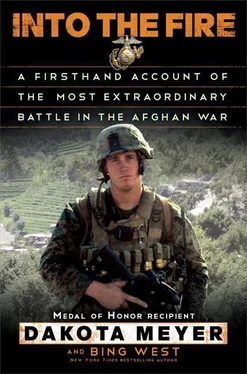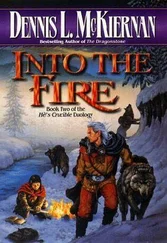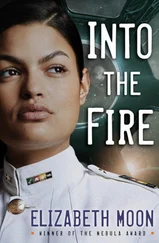I was in New York City, at the Twin Towers site, Ground Zero, with Gunny Joshua Peterson, someone I knew from my first days in the Corps. We were greeted by hundreds of police, firemen, construction workers, Wall Street guys in suits, city officials, and the families of the fallen.
“Meyer, I can’t believe this scene,” Gunny Peterson said. “Make sure your ribbons are squared away.”
We stood side by side, two grunts in sharply ironed khakis, waving like we had won an election. I thought of my sad, fumbling meetings with the families of Team Monti when I couldn’t think of much to say; I was alive and their loved ones were not. Now here I was standing before a monument for three thousand dead.
I saw some big ironworkers in hard hats standing off to one side. When the ceremony ended, they sneaked me onto a work elevator. Up we went to the top of the ride, where we then climbed wooden ladders until we couldn’t go any farther and there weren’t any guardrails. I stood there looking out at the most beautiful country in the world, trying to make sense of my feelings. This was where it had started, so many good people lost, the people who had been working here, and the people I had known who had not gone blindly into uniform, they had reasoned why—Americans do that—but they had gone ahead to do and to die.
An ironworker handed me a silver marker. I wrote on a girder:
For those who gave all.
I cannot finish my account without making a special appeal. I’m a Marine sergeant, but I hope the higher-ups in the U.S. Army will listen. On the battlefield, we’re all brothers. Rank and service make no difference, and the basic truth is that Capt. Swenson was not treated fairly.
Will Swenson wasn’t excitable or impulsive. He wasn’t a hard-core jock like Lt. Kerr, primed to take on all comers. Will was your classic laid-back college graduate from the outdoors state of Washington. He sailed, skied, climbed mountains, and traveled the globe. He gave others their space while he went about his job without fuss or drama. Swenson was this quiet, dangerous dude who never said much while calling in fire missions to blow away jihadists. He was the George Clooney type—cool, detached, and lethal when you least expected it.
Swenson had been infuriated by the lack of fire support at Ganjigal. He had signed statements blasting the rules of engagement and the attitudes of higher headquarters.
“I get these crazy messages saying that, ‘hey!, brigade is saying you can’t see the target from your OT [observer-target line],’ ” he wrote. “Brigade, you’re in Jalalabad. Fuck you. I am staring at the target…”
“Fuck you,” to his high command. For Swenson to blow up like that in a sworn statement, you knew the frustration came from deep in his heart. He felt he had crossed the line with those high above him.
“I’m still sleeping in my [sleeping] bag,” Swenson said a few weeks after he testified. “I expect to be kicked out.”
Hundreds of soldiers and officers at all levels knew that Swenson had been nominated for the Medal of Honor. Gen. Dunford met with Swenson at Joyce in mid-November to thank him for his courage. Dunford’s schedule had been coordinated at all the senior commands. Yet no Army general flew to Joyce to meet with Swenson.
Lt. Col. Mark O’Donnell signed the recommendation for the Medal of Honor in December of 2009. The form, together with thirty-five supporting appendices, was sent to the 4th Infantry Brigade, the next higher headquarters. The brigade commander signed the form, added a handwritten endorsement, and in January sent it to the Combined Joint Task Force, or CJTF-82, commanded by Maj. Gen. Curtis Scaparrotti.
JTF-82 was an infantry command, where performance in battle is everything. A nomination for the Medal of Honor was a huge happening. If you join the Army or Marine Corps, you obey its rules and trust the institution to apply the same rules to everyone—corporals, captains, and generals. Strict regulations prescribed the chain of custody and signatures required for the Medal of Honor.
Army Maj. Gen. Jeffrey Schloesser, who commanded RC-East in 2008, nominated three soldiers for the Medal of Honor. “The process of nominating,” he said, “is truly one of the most important things a commander does in combat.”
In 2009, Maj. Gen. Scaparrotti took command of RC-East, and unfortunately Swenson’s nomination was eventually lost. This occurred during a period of intense scrutiny into CJTF-82. In addition to the investigation into the events at Ganjigal, three other investigations were under way regarding CJTF-82’s combat procedures. In May of 2009, the insurgents had overrun an outpost north of Joyce called Bari Alai. Three American and two Latvian soldiers had died, leading to an investigation by the television correspondent Dan Rather. In July, Battalion 1-32 was sent north to fight in a fishbowl called Barge Matal, leading to questions about operational decision-making. Then followed the ambush at Ganjigal, with an initial investigation that infuriated the Marine Corps. In October, an outpost named Keating was overrun, with a loss of eight U.S. soldiers. Another investigation was opened. Then in November, a second investigation into Ganjigal revealed serious command errors.
Swenson symbolized Ganjigal, and Ganjigal conveyed the wrong message: failure to support advisors, failure to provide artillery support, failure to deliver timely air support, et cetera.
In the midst of all those investigations, Gen. Scaparrotti’s headquarters lost the one-inch-thick packet recommending the Medal of Honor. The processing guidelines were crystal-clear, with no ambiguity. Plus, at the end of each calendar year, the orders log and a specific form had to be uploaded into the Army electronic archives. CJTF-82 did not follow those steps. Swenson’s nomination for the award held most sacred in the military disappeared without a trace. The packet had vanished into thin air, forgotten by everybody in the chain of command.
When Swenson returned to the States in the winter of 2010, he was assigned to Fort Lewis in Washington, where the overall commander was Scaparrotti, who had been promoted to lieutenant general. Several briefings for Scaparrotti included the name of Will Swenson as the author. But the general never called Swenson in for a chat.
Swenson had been wrong to fear that the Army would fire him. Instead, he served out the remainder of his term and resigned quietly. The Marine Corps awarded each of my four fallen comrades a posthumous Bronze Star with combat V. Army Sgt. 1st Class Westbrook received no such combat V, and Swenson’s career as a grunt was over.
In August of 2010, Col. Daniel Yoo, my senior advisor commander, on two occasions informed the Marine Central Command about the recommendation for Swenson. Yoo wrote that he was noting this “for the record.” This was a subtle way of suggesting that Central Command ask what had happened to the missing award packet.
In April of 2011, Gen. George Casey, the chief of staff of the Army, was notified by an unofficial back channel that “Swenson received no award. This has caused disquiet among those who were at Ganjigal.” Casey alerted the senior Army staff to begin a search for Swenson’s lost file. A senior Army staffer in Afghanistan conducted an informal investigation, found the lost recommendation, and resubmitted it in August.
The overall commander in Afghanistan, Gen. John R. Allen, took up the chase in August, requesting Swenson’s file be brought to him. Lt. Gen. Scaparrotti was back in Afghanistan as the Corps commander. His staff sent Allen a duplicate packet of the original recommendation. Allen immediately endorsed the recommendation and graciously wrote a letter of apology for the delay to Swenson. Asked why he did this when he had not been in command two years earlier and had no responsibility for the oversight, Allen replied, “Because it was the right thing to do.”
Читать дальше












